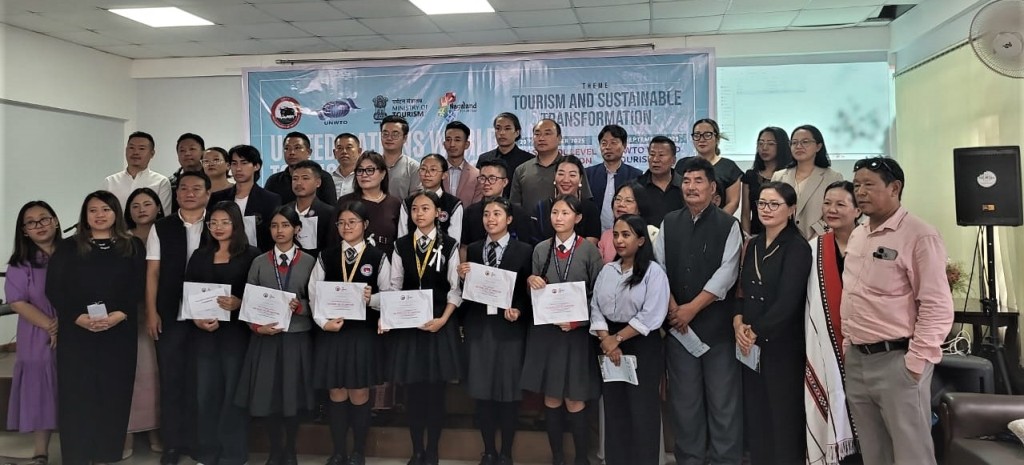Nagaland highlights sustainable tourism on World Tourism Day, urging eco-friendly practices, cultural preservation, and community-driven development initiatives.
Share

KOHIMA — Highlighting the dangers of unchecked tourism leading to environmental degradation, cultural dilution and economic disparity, Nagaland’s Commissioner and Secretary for Tourism, Arenla Jamir, on Saturday urged that sustainable tourism be embraced not merely as a concept but as a collective commitment.
She was speaking at the United Nations World Tourism Day (UNWTO) programme organised by the department of Tourism in Kohima.
Jamir asserted that tourism holds immense potential for Nagaland, often referred to as the “Land of Festivals,” blessed with rich cultural heritage, scenic landscapes and vibrant biodiversity.
Also read: Nagaland signs MoU to promote jute cultivation across seven districts
From the Hornbill Festival to the untouched terrains of Dzükou Valley, from tribal traditions to handloom and handicrafts, and from unique cuisines to eco-tourism initiatives, the state offers a rare blend of nature and culture, she said.
The officer maintained that the Hornbill Festival has placed Nagaland on the global tourism map, showcasing its rich tribal heritage and attracting visitors worldwide.
Initiatives like village homestays, handwoven textiles, cuisines and eco-tourism, she said, are empowering rural communities, creating livelihoods and preserving identities.
“As we celebrate the beauty and uniqueness of Nagaland, we must also reflect on the path forward — one that ensures tourism becomes a vehicle for inclusive growth, economic empowerment and environmental sustainability,” she said, stressing the urgent need for sustainable transformation.
Nagaland, she said, has the opportunity to adopt a model that is community-based, ecologically responsible and culturally respectful.
This requires preserving forests, rivers and mountains; protecting tribal traditions and languages; promoting local entrepreneurship; and passing on a thriving ecosystem and culture to future generations.
Jamir highlighted steps taken by the department of Tourism to make tourism a pillar of sustainable development. These include promoting community-based tourism through homestays, village tourism and eco-camps where local communities remain the primary stakeholders.
The department is also training youth as tour guides, cultural ambassadors and hospitality professionals, preparing them to become torchbearers of responsible tourism.
Several eco-tourism sites are being developed and maintained under strict guidelines to ensure minimal ecological impact, she said.
Digital tools such as Virtual Reality (VR) are also being used to showcase lesser-known destinations and regulate tourist inflow.
Through collaboration with NGOs, experts and international agencies, the department is aligning its strategies with global sustainability goals, she added.
Jamir underscored that achieving these visions requires collective responsibility. Sustainable transformation, she said, is not the government’s task alone but demands partnerships among departments, communities, private stakeholders, NGOs and tourists themselves.
She urged youth to become cultural entrepreneurs, documenting and promoting their heritage with pride. Local communities, she said, must continue to be custodians of land and culture, while visitors should arrive with open hearts and responsible intentions.
“Tourism should not only be about taking from a place but also about giving back to the people, the land and the culture,” Jamir reminded.
She encouraged reimagining tourism not as an industry but as a movement — one that uplifts lives, celebrates identities and nurtures the environment.
She further called for efforts to make Nagaland a shining example of how tourism, when pursued responsibly, can be truly transformative — bridging people and cultures, balancing development with nature, and connecting traditions of the past with opportunities for the future.
The programme also featured speeches by Neikedolie Hiekha, recipient of the Khonoma Upgrade Programme by UN Tourism 2022; Nino Zhasa, winner of the Best Tour Operator Award 2024; and Velasuzo Shijoh, Ex-Chairman of Diezephe Craft Village, which won the Ministry of Tourism’s Best Tourism Village (Bronze Category) in 2023. Assistant Director Vilika Zhimomi read out the UNWTO message from UN Secretary-General Antonio Guterres.